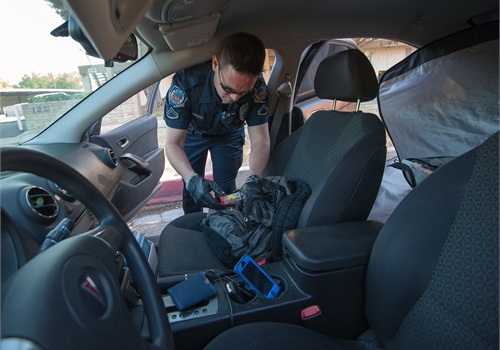Until recently, Pennsylvania law enforcement officers were required to obtain a warrant or permission from the vehicle’s owner before searching any vehicle, making any evidence obtained without a warrant void. At the end of April 2014, however, the Supreme Court ruled that police officers don’t necessarily have to have a search warrant if there is a “probable cause” for the search without one. This was decision was a split one, with sharply worded statements released from each side of the conflicting decision.
The case came along after a controversy over a traffic stop that took place in 2010. A man in Pennsylvania was stopped for a routine traffic violation when officers thought they smelled marijuana coming from the vehicle. Although the man admitted to having the drug on him, the police failed to get a search warrant before searching his car and locating two pounds of the substance. The man argues that they discovered the drug through illegal actions, but the courts ruled otherwise. So, what good and bad sides are there to this decision?

The Good
Warrants can sometimes be a bit of a pain to get, but with today’s technology, it doesn’t normally take a large chunk of time. The local police hope that this leniency of the rules will help them immensely when it comes to drug investigations. This decision is also cohesive with the standards that the federal courts have been following. Although most states have stricter search and seizure laws, the federal law has its roots in probable cause searches. The hope is that, by states adopting this ruling as law, it will help avoid unnecessary confusion, problems, and inconsistency by conducting the warrant-free searches in a standard manner.
The Bad
Many opponents of this ruling, including the defense attorneys on the case, are saying this is an unwanted move toward more governmental power. Some go as far as saying that the warrant-less vehicle searches are a movement towards rapidly decreasing citizens’ personal privacy and freedom. One Justice even claimed that this ruling contradicts where most of the United States has stood on the issue of unreasonable search and seizure over hundreds of years. It is also argued that with today’s technology, it takes very little time for officers to secure a warrant for a search and seizure of a victim’s vehicle. Without having to get permission to search, there is a fear that the searching because of a “probable cause” will be abused by law enforcement officials.
No matter where you stand on this issue, it is good information to note. Keep an eye out for your state and see if they adhere to the laws that have been in place for years, or if they see usefulness in leniency when it comes to vehicle searches. Knowing the laws that your state abides by can both keep you out of trouble and give you a valid defense if the time comes.
Written by Kellie Bertels, an attorney with the firm Bandré, Hunt & Snider, LLC where they are the leading attorneys in Jefferson City MO.














No Comments
Leave a comment Cancel